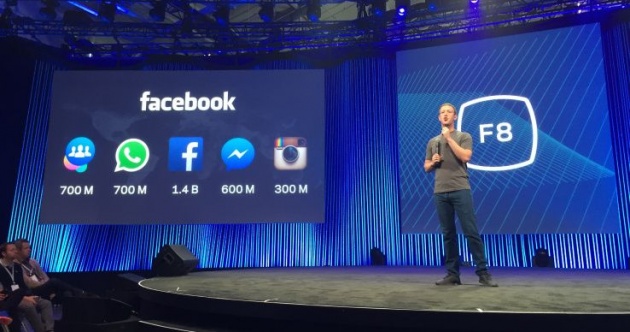
A company can’t easily shore up its weaknesses, especially when it grows to the size of Facebook, but the social network has managed to slowly but surely reinvent itself on mobile in a way that makes sense and resonates with users. FB surely stumbled along the path, and some of its efforts even drew outright scorn, but presumably the ill-fated experiments informed recent successes, and so it’s worth a quick examination of how we got from here, from there.
Early Days
The original Facebook mobile app for iPhone was one of those things that seemed like a knee-jerk reaction to a problem the social network wasn’t exactly sure existed. It did the job, but not with any degree of elegance or special ability to delight. It wasn’t until CEO Mark Zuckerberg admitted their cross-platform approach was insufficient to the task and focused on native experiences that the core Facebook app became something more enjoyed, and less ‘tolerated.’
The core experience was never the real problem though; Facebook’s other attempts to deliver a mobile native product offering that had similar resonance with users was the big issue. There were some ill-conceived hardware partnerships, like the HTC Status and then the HTC First, and Facebook Home, the Android launcher that premiered on the First and then made its way to other devices (for the few million who’ve actually installed it since its introduction, which pales in comparison to the Play Store download numbers of either FB or Instagram by exponential margins).
Facebook Home misunderstood how users valued the social network; it wanted to overlay a user’s phone UX the way Facebook itself wants to overlay web browsing for a good percentage of the Internet-using population. The takeover was too overt, however, and missed the appreciate users have for siloed, differentiated app experiences, assuming once again that what was good for the web would be good for mobile, but in a different (read: worse) way than the original FB iOS and Android core app had.
Growing Pains
There was also Facebook’s Paper app, which was released in early 2014, and which acted as a newsreader for articles shared on Facebook. It still exists (as does Home and many other FB app experiments), but despite some early enthusiasm from the tech press, it hasn’t lit a fire under general users. Likewise, Rooms presents an interesting alternative to web forums, but it remains an app most average FB users I know haven’t even heard of.
The new Facebook mobile identity isn’t represented by these curious offshoots, or by the FB app or identity itself, however; they consist of WhatsApp, which Facebook gets credit for simply because it hasn’t apparently changed the company’s course; Instagram, which is doing an incredibly good job of protecting its territory with excellently executed ‘moat’ apps like Layout that provide extended function for hardcore users while keeping them in the flock, all while keeping the core experience clean; and Messenger, which it shrewdly recognized would benefit immensely from a hard split with the core FB application, despite growing the initial outcry from some users.
Glory Days
Messenger becoming a platform illuminates why that separation was necessary, as it will now plug in to a network of other standalone apps, which would’ve been a tortured relationship otherwise. As a standalone experience, however, Messenger is complemented by external apps, as these can remain completely optional for users who value the core messaging experience and don’t want that to change, while also making it easier for users looking to add more to do just that.
The approach, applied to both Instagram and Messenger, stands as the best chance Facebook has ever had to really drive mobile engagement without simply replicating its success on the desktop on smaller devices. Looking at FB’s past successes and failures provides a good breadcrumb trail for how it got from there to here, but it doesn’t necessarily offer a good way to predict next steps. Suffice to say, what it’s doing now on mobile is far more interesting, and engaging, than what it was doing even just one year ago, and that bodes well for the future.



